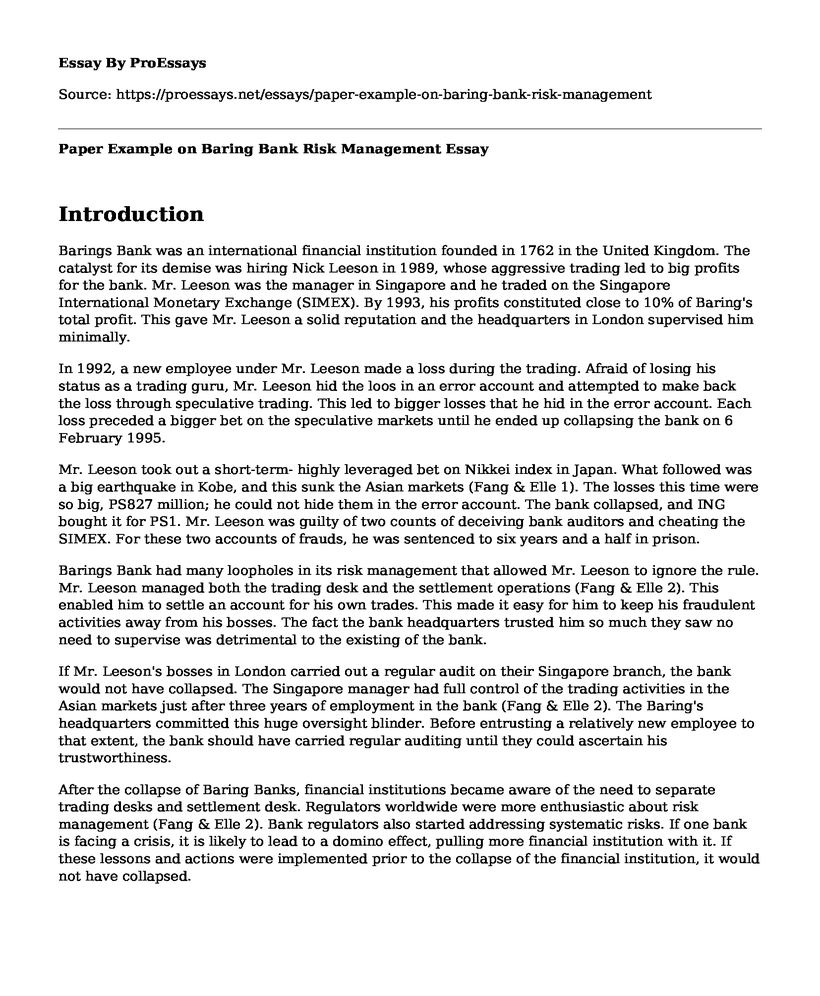Introduction
Barings Bank was an international financial institution founded in 1762 in the United Kingdom. The catalyst for its demise was hiring Nick Leeson in 1989, whose aggressive trading led to big profits for the bank. Mr. Leeson was the manager in Singapore and he traded on the Singapore International Monetary Exchange (SIMEX). By 1993, his profits constituted close to 10% of Baring's total profit. This gave Mr. Leeson a solid reputation and the headquarters in London supervised him minimally.
In 1992, a new employee under Mr. Leeson made a loss during the trading. Afraid of losing his status as a trading guru, Mr. Leeson hid the loos in an error account and attempted to make back the loss through speculative trading. This led to bigger losses that he hid in the error account. Each loss preceded a bigger bet on the speculative markets until he ended up collapsing the bank on 6 February 1995.
Mr. Leeson took out a short-term- highly leveraged bet on Nikkei index in Japan. What followed was a big earthquake in Kobe, and this sunk the Asian markets (Fang & Elle 1). The losses this time were so big, PS827 million; he could not hide them in the error account. The bank collapsed, and ING bought it for PS1. Mr. Leeson was guilty of two counts of deceiving bank auditors and cheating the SIMEX. For these two accounts of frauds, he was sentenced to six years and a half in prison.
Barings Bank had many loopholes in its risk management that allowed Mr. Leeson to ignore the rule. Mr. Leeson managed both the trading desk and the settlement operations (Fang & Elle 2). This enabled him to settle an account for his own trades. This made it easy for him to keep his fraudulent activities away from his bosses. The fact the bank headquarters trusted him so much they saw no need to supervise was detrimental to the existing of the bank.
If Mr. Leeson's bosses in London carried out a regular audit on their Singapore branch, the bank would not have collapsed. The Singapore manager had full control of the trading activities in the Asian markets just after three years of employment in the bank (Fang & Elle 2). The Baring's headquarters committed this huge oversight blinder. Before entrusting a relatively new employee to that extent, the bank should have carried regular auditing until they could ascertain his trustworthiness.
After the collapse of Baring Banks, financial institutions became aware of the need to separate trading desks and settlement desk. Regulators worldwide were more enthusiastic about risk management (Fang & Elle 2). Bank regulators also started addressing systematic risks. If one bank is facing a crisis, it is likely to lead to a domino effect, pulling more financial institution with it. If these lessons and actions were implemented prior to the collapse of the financial institution, it would not have collapsed.
Conclusion
The collapse of Baring's Bank teaches us a couple of things. First, any companies engaging in trading learnt the need to separate risk management systems and trading functions. The two distinct entities should have a clear line of reporting and supervision reaching to the highest level of management. Secondly, financial institution learnt they cannot ignore their supervisory roles on their employee and walk away unharmed. They have to reign in their employees and ensure that they are following all the laid procedures and rules.
References
Bair, S.C. Lessons from the Barings collapse. Fordham law review, vol. 64 (1). 1995. PDF.
Fang, J., And Elle, J. EthicalSystems.org case study: Barings Bank. EthicalSystems. 2014. PDF.
Cite this page
Paper Example on Baring Bank Risk Management. (2022, May 21). Retrieved from https://proessays.net/essays/paper-example-on-baring-bank-risk-management
If you are the original author of this essay and no longer wish to have it published on the ProEssays website, please click below to request its removal:
- Bitcoins Usage Essay Example
- Project Discussion on Federal Income Taxation Paper Example
- Assignment Example on Time Management
- Leadership and Ethical Decision Making Essay Example
- Project Management Case Study
- Essay Sample on Bankruptcy: A Legal Process of Debt Relief
- Essay on Tension Between Private and Public Policing: Budgetary Challenges and Collaboration







